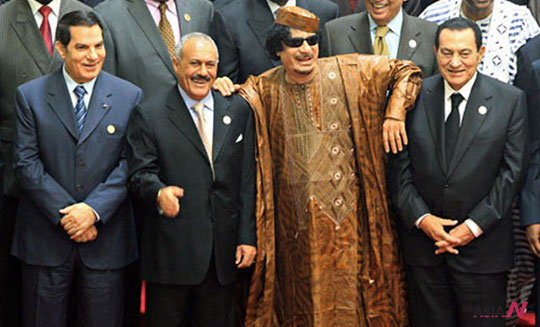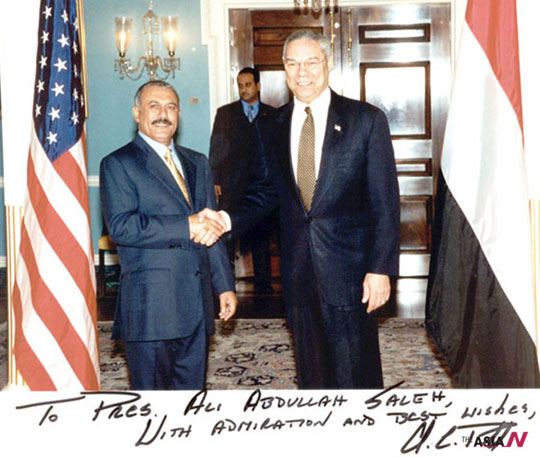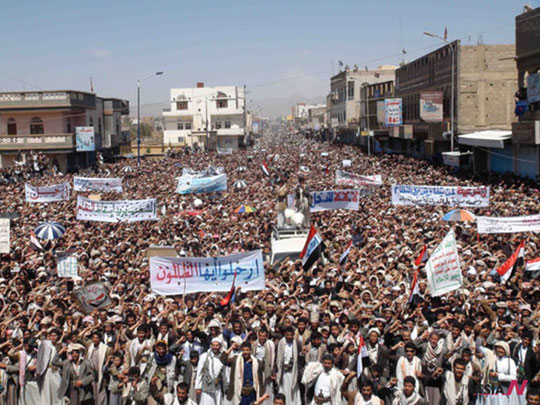The Fallen Four of the Middle East
With the scene of (previous) Yemeni president, Ali Abdullah Saleh, signing the agreement of authority transfer in his own country, we come to an end for the fourth dictator of the famous photo, taken in Libya, representing him, with his colleagues; the escaping president of Tunisia; Bin Ali, who fled to Saudi Arabia, the ex-president of Egypt, who is being treated in a luxurious hospital prisoned in Cairo, and president of Libya who was killed and tortured by some of his nationals.
This last scene is considered at least success for Saudi Arabia, and her King; Abdullah, who tried very hard to stop the Arab Spring revolutions, with the fear that such quaking movement could shake his throne as well. The King tried to keep Ali Abdullah Saleh in power, as much as he could, to prevent any new power to hold his neighbor country. At last, he obeyed the United States and Britain’s pressure to persuade the Yemeni president, Ali Abdullah Saleh, to formally stand down. This was not the first time, as Ali Abdullah Saleh did it before when he flied to Riyadh for treatment for injuries that were sustained in shelling in Sana’a, last summer. Saleh seemed recovered following emergency medical treatment in a Riyadh military; he was injured by shrapnel when his palace compound was attacked by tribal rivals. He looked very happy, wearing the western suits, different from his usual tribal national clothes.
I believe western diplomats assured Saleh that Washington and London are going to protect him that is the reason of his near future travel to the United States, to continue his treatment, as the Gulf officials said. It was clear that he did relinquish power in exchange for immunity from prosecution and financial guarantees about his future. This was the best deal, compared with the other fallen dictators.
Pro-democracy protestors in Yemen are celebrating Saleh’s departure, after 33 years in power, but the Arab world’s poorest country still faces turmoil as well as immediate concerns over the future, with the reactions of the Yemen’s ruling party, the General People’s Congress.
Yemen, a desperately poor and volatile country of 23 million people, faces a complex series of problems including secessionist movements in the north and south, inter-elite and tribal rivalries and a small but menacing al-Qaida presence that has focused US and western attention and brought generous aid in recent years.
The nine months of deadly street protests calling for Saleh’s resignation have given a fruitful end. For him, he escaped the grisly fate of Muammar Gaddafi in Libya, and I believe that such end, that is refused by humanity and religions may have helped to focus his Saleh’s mind, along with international pressure.
Faced with the choice between a possible asset freeze and a promise of immunity from prosecution in the GCC deal, Saleh has opted for the latter. But although he has signed, he hasn’t quite gone yet. He will nominally remain as president until a successor is elected, while the vice president – in theory at least – assumes all his powers.
Some are suspicious that this would not be enough to calm the situation on the ground in Yemen. Vice president Abd al-Rab Mansur al-Hadi is a fairly weak figure who lacks a significant support base, either in politics or the military. Saleh’s numerous relatives continue to hold key positions from where they can manipulate the strings on his behalf.
According to the plan, though, Hadi will press ahead with forming a government of national unity ahead of an early presidential election – supposedly to be held 3 months later. But the emphasis on the presidency is not the key to solve Yemen’s problems; the country really needs a more effective parliament and a less powerful president.
Abd al-Rahman Mansur al-Hadi, is considered a political lightweight, a non-charismatic and shadowy figure who enjoys little support inside or outside the military – always a powerful player in Yemen’s volatile politics. He has military experience, having received training in the UK, Egypt and Russia, but is said to have little clout and was promoted to vice-president as a gesture to the south. Although from the south – he was born in 1945 in al-Wade’ district in Abyan governorate – he defected with his unit to north Yemen following the bloody struggle in former Marxist south Yemen. He was rewarded for his role in the 1994 civil war between the north and the south by being appointed first minister of defense and then as vice-president. He graduated in 1964 from the Aden military school, before undergoing his international training.

























































